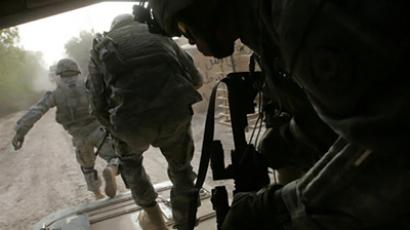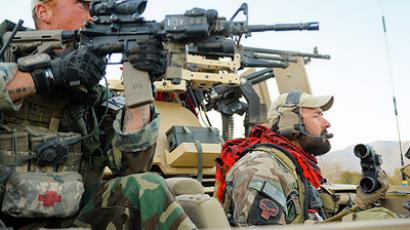Military contracting last defense in bad US economy

It is career day in Charlottesville, Virginia, and for one industry, business is booming.
“Business has been great. As a small business we've had a 100% revenue increase since 2004,” said Sasha Dombrovskis, a defense contractor with OG Systems. “We're going into this year with a significant revenue increase.” From Northrop Grumman to Batelle, Pragmatics to BAE, many of the biggest names in defense contracting were at the Charlottesville Community Job Fair, held at the University of Virginia on April 27. “Business is very good for BAE Systems currently. We’re the second largest defense contractor in the world,” said Joe Nestor of BAE Systems. “Anything that dept of defense does we do as well, to support them. So we've been fortunate over the last couple years to experience a considerable amount of growth.” For defense contractors, that growth is in part to the U.S. presence in Iraq, Afghanistan and at the US’s more than 1,000 military bases worldwide. “We are located overseas in Iraq, Afghanistan, Germany, and South Korea. We have a lot of opportunities in the United States as well as overseas,” said Erin McCarthy, a recruiter for Northrop Grumman. Charlottesville, Virginia is home to more than 161 defense contracting firms, which made more than $919 million from 2,737 contracts in the last two years. Real estate advisor and author Michael O’Brien went to Iraq as a defense contractor to “help.” “I realized after I had been there nearly a year—I was there 14 months—that I was just a warm body to collect fees for my company. They sell this contract to [the Department of Defense], and of course my company is headed up by a retired Chief of Staff of the US Army, so no active-duty army officer is going to kick this guy out of office,” he said. O’Brien said he became disillusioned with the corruption and mismanagement. “They were taking land from Iraqis without securing title. When I brought this up to them, I said, ‘would you build a house in the United States without securing title?’ The guy kicked me out of his office,” he remarked. O’Brien said Americans won’t see the end of defense contractors anytime soon. Without a draft, the military depends on more than 100,000 contractors to support its two wars abroad.“When when Dwight Eisenhower talked about the military industrial complex in 1951, we're there now. We're there and it's almost like the tail is wagging the dog.” Former Secretary of Labor Robert Reich said that without the defense industry, America’s 9 percent national unemployment rate would soar to 11.5 percent. Job seekers in Charlottesville said that military contracting is their best defense in economic tough times.Author David Swanson of "War is a Lie" explained tax cuts for working people and putting the monies spent on defense elsewhere would create many more jobs than the defense industry. The government has not cut defense or military spending. It continues to expand, to propel war and violence, Swanson noted.“We could cuts 85 percent of this machine and still have the world’s biggest military,” he added. “We need to convert.”Spending elsewhere would create more jobs and help far more Americans. Lawmakers are afraid to cut funds to defense for fear of being seen as week on national security or for being accused of laying off defense workers – even though more jobs would be created by reallocating funds.“We need to convert these industries to peaceful industries. A factory that makes weapons could make trains, could make solar panels,” Swanson said. “There is no reason we can’t do better, economically and otherwise.”














